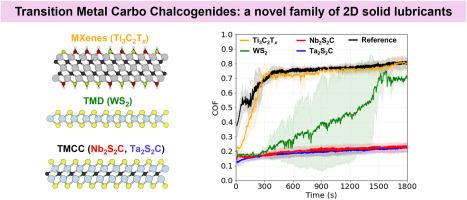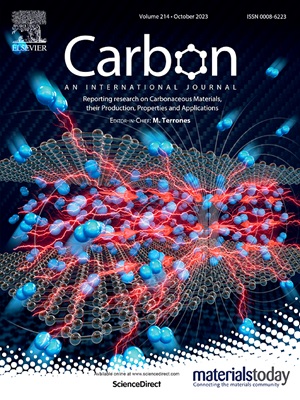过渡金属碳瑀:新型二维固体润滑剂系列
IF 10.5
2区 材料科学
Q1 CHEMISTRY, PHYSICAL
引用次数: 0
摘要
二维(2D)层状材料,如过渡金属二钙化物(如 MoS2、WS2)和 MXenes(如 Ti3C2Tx),以及这些材料的混合物,因其卓越的性能而成为当前固体润滑研究的重点。过渡金属碳钙烯酸盐 (TMCC) 由一个 MXene 核心和一个类似于 TMD 的表面组成,是 TMD 和 MXenes 的固有组合,无需从单个层中构建混合物。由于其分层结构和表面化学性质,这些新型材料有望获得良好的摩擦学特性。本文讨论了将多层 Ta2S2C 和 Nb2S2C TMCC 仅作为粉末沉积到钢基体上,并讨论了它们在不同反面(即 Al2O3、SiC、100Cr6 和聚四氟乙烯 (PTFE))的线性滑动下的摩擦学特性。先进的材料表征技术用于检测磨损轨道内是否存在 TMCC,并揭示其在三膜内的二维结构。最后,利用密度泛函理论(DFT)模拟揭示了 TMCC 在纳米尺度上的易剪切性。研究结果证明了这种新型二维材料家族的巨大潜力,同时也为定义调整固-固界面提供了多种可能性。本文章由计算机程序翻译,如有差异,请以英文原文为准。

Transition metal carbo chalcogenides: A novel family of 2D solid lubricants
Two-dimensional (2D) layered materials such as transition metal dichalcogenides (e.g., MoS2, WS2) and MXenes (e.g., Ti3C2Tx), as well as hybrids of these materials are the focus of current research in solid lubrication due to their outstanding performance. Transition metal carbo-chalcogenides (TMCCs), consisting of an MXene core and a TMD-like surface, represent an inherent combination of TMDs and MXenes without the need to construct hybrids out of the individual layers. Due to their layered structure and surface chemistry, favorable tribological properties can be expected from these novel materials. Here, multilayer Ta2S2C and Nb2S2C TMCCs are deposited solely as a powder onto a steel substrate and their tribological properties under linear sliding against different counterbodies, i.e., Al2O3, SiC, 100Cr6, and polytetrafluoroethylene (PTFE) are discussed. Advanced materials characterization techniques are used to detect the presence of TMCCs inside the wear tracks and to reveal their 2D structure within the tribofilm. Finally, density functional theory (DFT) simulations are used to unravel the easy shearability of TMCCs at the nanoscale. The results demonstrate the great potential of this new 2D material family, which also offers many possibilities for defined tuning of the solid-solid interface.
求助全文
通过发布文献求助,成功后即可免费获取论文全文。
去求助
来源期刊

Carbon
工程技术-材料科学:综合
CiteScore
20.80
自引率
7.30%
发文量
0
审稿时长
23 days
期刊介绍:
The journal Carbon is an international multidisciplinary forum for communicating scientific advances in the field of carbon materials. It reports new findings related to the formation, structure, properties, behaviors, and technological applications of carbons. Carbons are a broad class of ordered or disordered solid phases composed primarily of elemental carbon, including but not limited to carbon black, carbon fibers and filaments, carbon nanotubes, diamond and diamond-like carbon, fullerenes, glassy carbon, graphite, graphene, graphene-oxide, porous carbons, pyrolytic carbon, and other sp2 and non-sp2 hybridized carbon systems. Carbon is the companion title to the open access journal Carbon Trends. Relevant application areas for carbon materials include biology and medicine, catalysis, electronic, optoelectronic, spintronic, high-frequency, and photonic devices, energy storage and conversion systems, environmental applications and water treatment, smart materials and systems, and structural and thermal applications.
 求助内容:
求助内容: 应助结果提醒方式:
应助结果提醒方式:


